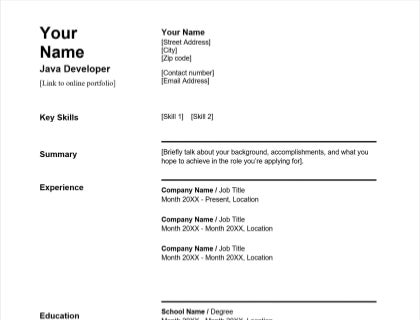
Java Developer Resume Free Template
Download this Java developer resume template in Microsoft Word format.
Download NowJava Developer Resume Example:
Your Name
Java Developer
[Link to online portfolio / website / LinkedIn profile]
[Street address]
[City]
[Zip code]
[Contact number]
[Email address]
Key Skills:
[Skill 1]
[Skill 2]
Summary:
[Briefly talk about your background, skills, and qualifications.]
Experience:
Company Name / Job Title Month 20XX - Present, Location
Company Name / Job Title Month 20XX - Month 20XX, Location
Company Name / Job Title Month 20XX - Month 20XX, Location
Education:
School Name / Degree Month 20XX - Month 20XX, Location
School Name / Degree Month 20XX - Month 20XX, Location
Certification:
[Certification 1]
[Certification 2]
Notable Achievements:
[Achievement 1]
[Achievement 2]
Awards:
- [Award 1]
How to Write a Java Developer Resume:

A step-by-step guide to writing the perfect Java developer resume.
Start with a summary.
Make your summary stand out.

You'll want your summary to create a good first impression, intriguing employers enough to continue reading your resume. Start by highlighting your most desirable qualities including your skills, years of experience, and greatest accomplishments.
Keep your summary short and to the point.

Aim to keep your summary under four sentences and only include the most pertinent information. Add a sentence about how your specific skill set and experience will benefit the employer's organization.
List your technical skills.
Start with your most important skills.

Your core Java developer skills, such as proficiency with MVC Frameworks, version control, web frameworks, multithreading and synchronization, and more.
Be sure to mention all relevant skills that could set you apart from other candidates.
Match your skill set with the job posting.

You'll want to list all relevant skills and competencies you have acquired over time. Directly match your skills with the job requirements. Do not list skills that will not be needed for the position.
Be truthful.

When listing your skills, remain honest about your level of expertise as the hiring process may require practical assessments.
Highlight your experience.
Add your work history in reverse chronological order.

The work experience section is an imperative part of your resume as employers will want to read about the Java projects and tasks you've completed at previous positions. You'll want to start this section with your most recent position.
Add the places you have worked.

Include the name of each company, your role, how long you worked there, and where the company is situated. Use bullet points to list the tasks and responsibilities for each position.
Pay special attention to the type of responsibilities you managed at previous jobs. This will help employers envision you in the role and determine the type of tasks you're knowledgeable in.
Outline your education information.
List your qualifications.

In reverse chronological order, add your qualifications, each with an institution name, the dates of attendance, and a location.
Mention qualifications in progress.

If you're studying towards a qualification, indicate it at the start of this section. Omit the initial date and instead include the words "In Progress."
Include your certifications.
List any relevant certificates.

While your portfolio of projects already says a lot about you and your abilities, to help improve your chances of an interview, consider adding relevant certifications, even if not required.
Start with your most relevant certificate.

If you obtained more than one certificate, consider which one employers would be most interested in and mention it first.
Common certificates related to Java developers include:
- Oracle Certified Associate Java Programmer.
- Apache Spark Developer.
Add certification details.

Be sure to mention the institution and the date you obtained your certification. Certificates awarded by accredited institutions indicate to employers that you have formal training and that you're passionate about your job.
Showcase your career achievements.
Add any major completed projects.

Your career milestones are a great addition to your resume because they act as solid references, proving to employers that you're more than capable of exceeding their expectations.
These could include adding new functions to applications using Java, testing code to see if changes met requirements and specifications, using Hibernate and Spring for application layering, and more.
List any awards and job promotions.
Add key career moments at the end of your resume.

These typically include awards of excellence or merit. Also mention job promotions that may be of particular interest to employers.
Use bullet points to briefly describe each entry and list them in reverse chronological order. Remember to identify institutions/employers and don't neglect to provide dates.
Employers hiring Java developers look for evidence of:
- An analytical, detail-oriented mindset.
- A knack for problem-solving, debugging, troubleshooting, testing, and deploying.
- Proficiency with languages including J2EE, HTML/CSS, SQL, AngularJS, Unix, and more.
- Experience with application server web-logic.
- Working as part of a team and with different departments, including front-end developers, database administrators, and more.
- A history of working under pressure to meet deadlines.
- A relevant degree in computer science and further certification will aid you.
- A link to your online portfolio that showcases a wide range of Java development projects.


